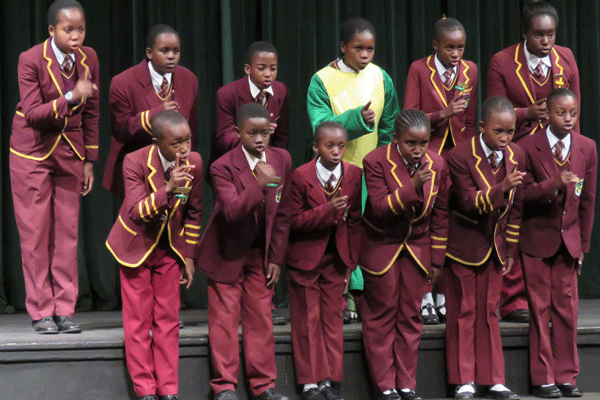
BY PHYLLIS MBANJE
The vaccination of children in Zimbabwe against Covid-19 is mired in confusion amid indications that health facilities in the capital, Harare are turning away those seeking the jabs.
President Emmerson Mnangagwa’s government last month announced that the Covid-19 vaccination exercise was now open for the 14 to 17 year age groups as part of its ambitious plans to reach herd immunity by December.
Since then, the vaccination programme that began in February this year had been for people aged 18 years and above.
Zimbabwe became one of the first countries in Southern Africa to open up the vaccinations to those aged 17 and below.
Information minister Monica Mutsvangwa said the decision was guided by empirical scientific evidence.
“Based on the advice of scientists, the vaccination programme will be extended to the 14 to 17 year age group,” she said during a post-cabinet media briefing a fortnight ago.
The programme, however, is yet to take-off, if the situation at Harare clinics is anything to go by.
- Chamisa under fire over US$120K donation
- Mavhunga puts DeMbare into Chibuku quarterfinals
- Pension funds bet on Cabora Bassa oilfields
- Councils defy govt fire tender directive
Keep Reading
Nurses at poly clinics run by the local authority have been turning away parents seeking Covid-19 vaccines for their children.
Innocent Ruwende, deputy spokesperson for Harare City Council, which runs the poly clinics in the capital said: “We are awaiting formal communication from the Ministry of Health.”
Agnes Mahomva, the head of the Covid-19 national task force, referred questions to the Health and Child Care ministry.
“The ministry of Health is leading this on the ground. Please check with them,” Mahomva said.
Donald Mujiri, head of protocol in the Health ministry, said the Medicines Control Authority of Zimbabwe (MCAZ) gave a conditional authority for vaccination of children.
“The condition is that, the ministry of Health and Child Care shall conduct a phase three clinical trial first before rolling out the vaccination; and the ministry is in the process of implementing the MCAZ conditions and once that is complete, the rollout will begin,” he said.
Other countries that have announced intentions to inoculate children include South Africa and the United Kingdom.
The European Medicines Agency (EMA) approved the use of the Pfizer vaccine for children aged 12-15 in May this year, the first Covid-19 vaccine to be given such approval in the European Union.
While the UK has approved vaccination of minors, the Joint Committee on Vaccination and Immunisation (JCVI) says it does not recommend vaccinating children aged 12-15 years old on health grounds alone.
It says children are at such low risk from the virus that vaccination would offer only “marginal gain”.
South Africa last Friday started vaccinating some children and adolescents as part of the global phase three clinical trials of China’s Sinovac Biotech Covid-19 vaccine for children aged between six months and 17 years.
The global study will enrol 2,000 participants in South Africa and 12,000 others will be taking part in Kenya, the Philippines, Chile and Malaysia.
In Zimbabwe, when schools re-opened in the last two weeks, some parents mostly at private run institutions were asked to give consent to vaccination of their children.
“The school administrator asked me if I was willing to have my child vaccinated and I said no since I still need to learn more about this,” said one parent.
Many parents and guardians have expressed , with most asking for supporting evidence that the vaccines are safe for children.
“I think we will be wasting the vaccines on these young people who still have stronger immunities to fight off the disease,” said Alois Mpande, from Harare’s Westlea suburb, remarked.
A caretaker at a preschool in Sunridge said the government needed to meet the current demand first.
“We are still seeing long queues at clinics so it will be worse when children join in,” he said.
“So the government should beef up supplies first.
Experts at John Hopkins have allayed fears saying the United State Food and Drug Administration (FDA) and the US Centres for Disease Control (CDC) have granted emergency use authorisation (EUA) for several Covid-19 vaccines.
“Current safety and efficacy testing of the vaccines for children aged two and upwards may lead to authorization of one or more of the Covid-19 vaccines for younger kids in the months ahead,” said the experts.
The scientists at Johns Hopkins believe that there are many benefits like preventing the children from getting Covid-19.
The latest variants have shown that even children are not totally safe.
“Although Covid-19 in children is sometimes milder than in adults, some kids can get severe lung infections, become very sick and require hospitalisation,” the experts said.
“Children can also have complications such as multisystem inflammatory syndrome in children that may require intensive care or long-lasting symptoms that affect their health and well-being.
“The virus can cause death in children, although this is rarer than for adults.”
They also explained that the vaccine can help prevent or reduce the spread of Covid-19.
“Like adults, children also can transmit the coronavirus to others if they are infected, even when they have no symptoms,” the experts added.
“Getting the Covid-19 vaccine can protect the child and others, reducing the chance that they transmit the virus to others, including family members and friends who may be more susceptible to severe consequences of the infection.”











